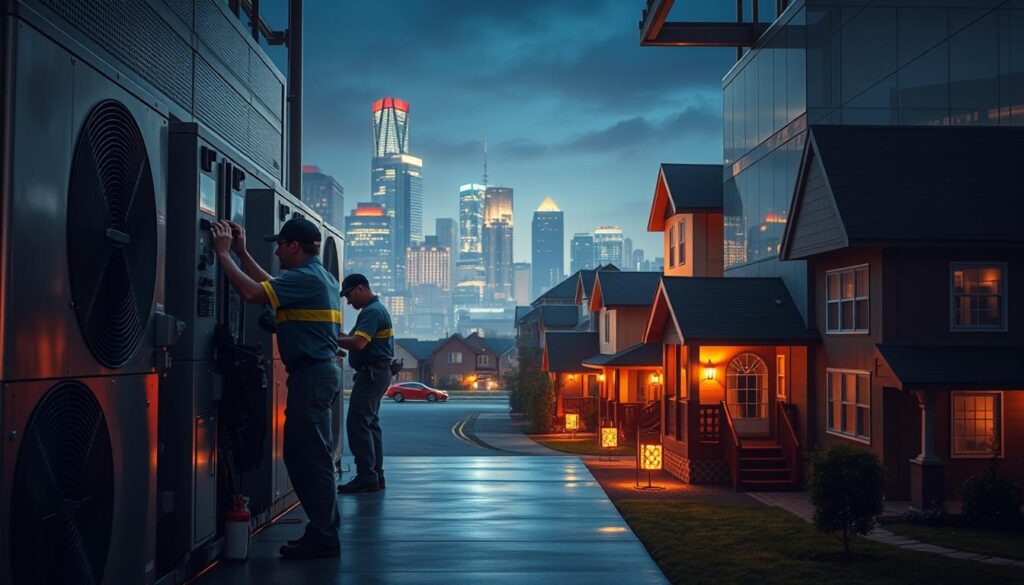Affiliate Disclosure
HVAC Guide Guys is a participant in the Amazon Services LLC Associates Program, an affiliate advertising program designed to provide a means for sites to earn advertising fees by advertising and linking to Amazon.
Ever wondered what happens behind the scenes of emergency heating and cooling repairs? How late do HVAC techs work when your home’s comfort is at stake?
HVAC technician work hours are far from a typical 9-to-5 job. These skilled professionals work in a world where comfort doesn’t follow a fixed schedule. They can work from 30 to 80 hours a week, depending on the season and emergencies.

Your home’s temperature doesn’t follow a strict timeline, and neither do HVAC technicians. In hot summers or cold winters, they are always ready to fix heating and cooling emergencies at any time.
HVAC technicians work in both homes and commercial buildings. They adjust their schedules to meet different needs. Their work changes with the weather, customer needs, and unexpected breakdowns.
Key Takeaways
- HVAC technicians work flexible hours, often beyond standard business time
- Peak seasons can extend work weeks to 50-80 hours
- Emergency calls can happen at any time, day or night
- Work hours vary by region, sector, and seasonal demand
- Technicians typically start work between 7:00 AM and 8:00 AM
Table of Contents
Understanding HVAC Technician Work Schedules
HVAC technicians work in a world that’s not just 9-to-5. Their hours change with the seasons and emergencies. They serve both homes and businesses.
Being an HVAC tech means being flexible. They adjust their schedules for urgent needs while keeping service high.
Standard Business Operating Hours
Most HVAC companies work from:
- Monday to Friday: 8:00 AM – 5:00 PM
- Weekends: They work less
- They usually respond in 24-48 hours for regular checks
Peak Season Variations
Extreme weather changes their work hours a lot. In summer and winter, they work longer to handle more calls.
| Season | Work Hour Changes | Client Demand |
|---|---|---|
| Summer | 6:00 AM – 8:00 PM | Many AC repairs |
| Winter | 7:00 AM – 7:00 PM | More heating emergencies |
Emergency Service Hours
HVAC emergency services are always on. Technicians are ready 24/7 for big system failures. They keep clients safe and comfy.
“In the HVAC world, emergencies don’t follow a schedule – and neither do we.” – Professional HVAC Technician
The need for HVAC techs is rising, with a 5% increase expected in the next decade. This shows the industry’s dedication to always being there for clients.
How Late Do HVAC Techs Work in Different Service Sectors
HVAC technicians work different hours in various sectors. Their schedules change a lot, depending on the place they work. This can be homes, businesses, or big industrial sites.
In homes, HVAC techs often get emergency calls late at night or early in the morning. This is because people need help fast when it’s really hot or cold outside.
- Residential sector: Flexible evening and weekend emergency responses
- Commercial sector: Scheduled maintenance and extended service windows
- Industrial sector: Possible 24/7 critical system support
At work places, HVAC techs usually work when it’s not busy. How late do HVAC techs work can vary. They might do maintenance in the evenings or check systems at night, based on what the client needs.
“In industrial settings, HVAC system reliability is critical, which means our work doesn’t always follow a traditional 9-to-5 schedule.” – Senior HVAC Technician
Industrial places have their own special needs. Some need HVAC techs to work all the time. This ensures the climate control systems work right, no matter the hour.
What you need from your HVAC service will decide how late techs work. This can vary a lot between different sectors.
Explore Our HVAC Shop
Looking for top-rated HVAC tools, parts, and accessories? Visit our shop and find the perfect solution for your needs.
Visit the ShopThe Impact of Seasonal Demands on Working Hours
HVAC technician work hours change a lot with the seasons. This creates big challenges for those in the field. It’s important to understand these changes to meet expectations and keep services running smoothly.
Seasonal demands greatly affect HVAC technicians’ workloads. The amount of work they do changes a lot throughout the year. This makes their job very dynamic, needing them to be flexible and plan ahead.
Summer Peak Hours
In the summer, HVAC techs work late nights because of the heat. They have to deal with:
- Long hours, often 10-14 hours a day
- More emergency calls
- More repairs and installations needed
Winter Emergency Calls
Winter is also a busy time for HVAC pros. The cold weather leads to many emergency calls. Techs need to be ready to work at any time.
| Season | Average Work Hours | Service Demand |
|---|---|---|
| Summer | 50-70 hours/week | High |
| Winter | 45-65 hours/week | High |
| Spring/Fall | 35-45 hours/week | Low |
Shoulder Season Schedules
Spring and fall are the shoulder seasons. During these times, HVAC techs work more regular hours. They can focus on maintenance, check-ups, and learning new skills.
“Seasonal adaptability is the key to success in the HVAC industry.” – Professional HVAC Industry Consultant
Planning ahead during these slower times helps HVAC businesses stay steady. It also prepares them for the busier seasons ahead.
After-Hours HVAC Emergency Services
When your HVAC system breaks down, getting it fixed fast is key. Most HVAC pros offer 24/7 service for heating and cooling emergencies.
Emergency HVAC services handle urgent issues that can’t wait. These include:
- Complete system failures
- Gas leak detection
- Electrical system malfunctions
- Extreme temperature scenarios
- Safety-related HVAC issues
Professional HVAC companies know emergencies happen anytime. Their techs are ready to help fast, keeping your place comfy.
“Our commitment is to provide immediate, reliable support whenever you need us most.” – HVAC Industry Professional
Emergency services aim for quick fixes. Technicians come ready with tools and parts to solve most problems right away.
The usual emergency service includes:
- 24/7 call center support
- Immediate dispatch of certified technicians
- Comprehensive diagnostic assessment
- On-the-spot repairs when possible
Choose a service that offers 24/7 support. It keeps your HVAC system running and your comfort level high during breakdowns.
Explore Our HVAC Shop
Looking for top-rated HVAC tools, parts, and accessories? Visit our shop and find the perfect solution for your needs.
Visit the ShopOn-Call Rotation Systems and Extended Support
HVAC companies use advanced on-call systems for continuous service. These systems ensure quick and efficient emergency heating and cooling help.
On-call technicians are key in extended HVAC support. They are always ready to fix unexpected system failures and urgent repairs.
Weekly Rotation Patterns
On-call systems follow structured schedules:
- Weekly shift assignments
- Bi-weekly rotation schedules
- Technician availability tracking
Emergency Response Protocols
HVAC services have clear emergency response plans:
- Initial contact within 15-30 minutes
- On-site arrival in 1.5-2 hours
- Fast response to critical failures
Compensation for After-Hours Work
| Work Type | Compensation Rate |
|---|---|
| Standard On-Call Hours | Base Hourly Rate + Flat Fee |
| Emergency Weeknight Calls | 1.5x Standard Rate |
| Weekend Emergency Service | 2x Standard Rate |
“Reliability and quick response are the hallmarks of exceptional HVAC service.” – Industry Expert
Good on-call systems need careful planning and clear communication. They ensure reliable extended support for customers’ urgent needs.
Regional Differences in HVAC Service Hours

Your location greatly affects how late HVAC technicians work. Different parts of the United States face unique climate challenges. These challenges change how often HVAC services are needed.
In places like Texas and Florida, HVAC services are needed more often. This is because these areas need cooling all year. During the hot summer months, air conditioning is a must. This leads to longer and more frequent service calls.
- Southern regions: Longer summer service hours
- Northern states: Extended winter heating service periods
- Coastal areas: Unique climate-specific service demands
Urban areas usually have more flexible HVAC service hours than rural ones. Cities can offer 24/7 emergency services. But, smaller towns might have fewer technicians available. The availability of HVAC techs depends on the area’s population and infrastructure.
“Climate determines service, and service follows climate” – HVAC Industry Insight
Seasonal changes greatly affect technician schedules. In busy seasons, HVAC workers might work longer hours. This is true for both winter heating needs in the north and summer cooling in the south.
Knowing about these regional differences helps people plan better for their HVAC needs.
Overtime Opportunities in HVAC Industry
HVAC technicians can earn more by working overtime. Knowing when to work extra hours can lead to more money all year.
Working after hours can be very profitable for skilled technicians. They get paid extra during busy times and emergencies.
Peak Season Overtime Dynamics
Extreme weather brings a lot of overtime work:
- Summer heatwaves mean 50-70 hours of work a week
- Winter cold snaps lead to emergency calls
- Overtime pay is 1.5 times the regular rate
Emergency Call Compensation
Emergency calls are a big money-maker. Technicians get paid more for urgent repairs after hours. This can really increase their monthly income.
Holiday Working Hours
Holiday work also means extra pay. Many HVAC companies pay more for work on holidays. This gives technicians more chances to earn.
“Flexibility and willingness to work non-standard hours can transform HVAC technician work hours into a financially rewarding career path.”
HVAC technicians can make more money by working overtime. With the current rules, they can earn more each year.
Explore Our HVAC Shop
Looking for top-rated HVAC tools, parts, and accessories? Visit our shop and find the perfect solution for your needs.
Visit the ShopManaging Work-Life Balance as an HVAC Tech
Being an HVAC technician can be tough on work-life balance. The job’s unpredictable hours often mean giving up personal time. On-call techs face irregular schedules that can hurt personal relationships and mental health.
To manage their demanding jobs, HVAC pros use smart strategies:
- Set clear lines between work and personal life
- Use good time management
- Talk openly with loved ones about work
- Make self-care and mental health a priority
“Maintaining balance isn’t about working less, but working smarter.” – Professional HVAC Technician
The physical and mental challenges of HVAC work need careful planning to avoid burnout. Companies are starting to support technicians’ well-being by:
- Offering flexible schedules
- Limiting long on-call shifts
- Providing mental health support
| Work-Life Balance Strategy | Potential Impact |
|---|---|
| Structured On-Call Rotations | Predictable Personal Time |
| Regular Break Scheduling | Reduced Mental Fatigue |
| Professional Development Support | Career Growth Opportunities |
Remember, your health and personal life are just as important as your professional success. With thoughtful strategies, HVAC technicians can have a rewarding career without sacrificing their well-being.
Different Shift Patterns in Commercial vs Residential HVAC

HVAC service hours vary a lot between commercial and residential areas. Residential techs face unpredictable schedules. On the other hand, commercial HVAC workers have more set hours.
Commercial HVAC work usually includes:
- Predictable shift patterns
- Scheduled late-night hvac maintenance for 24/7 facilities
- Regular work in hospitals, data centers, and industrial complexes
Residential HVAC techs work in a more varied setting. Their hours can be:
- Standard daytime maintenance appointments
- Emergency home calls at any hour
- Highly variable scheduling based on client needs
“The unpredictability of residential HVAC work requires technicians to be flexible and always ready,” says industry expert Mark Rodriguez.
Commercial sectors offer more regular work hours. Residential techs, though, must be ready for emergencies at any time. This affects their work-life balance and pay.
| Sector | Typical Work Hours | Emergency Availability |
|---|---|---|
| Commercial HVAC | Structured shifts | Planned maintenance windows |
| Residential HVAC | Flexible scheduling | 24/7 emergency response |
Knowing these differences helps HVAC techs pick the right career path. It’s about finding a job that fits their lifestyle and goals.
Explore Our HVAC Shop
Looking for top-rated HVAC tools, parts, and accessories? Visit our shop and find the perfect solution for your needs.
Visit the ShopLate Night Emergency Response Protocols
HVAC emergency services need strict rules for quick and safe help at night. If your heating or cooling stops working late, knowing how repair teams work is key. This is important for both homes and businesses.
Professional HVAC teams have set up detailed systems for handling late-night calls. These systems keep both the techs and customers safe during emergencies.
Priority Service Categories
Emergency teams sort calls by how urgent and risky they are. The most critical include:
- Complete heating system failure during winter
- Total cooling system breakdown during extreme heat
- Potential gas leak situations
- Electrical system malfunctions
- Critical medical facility equipment failures
Response Time Requirements
Good hvac emergency services try to send techs fast:
| Priority Level | Maximum Response Time |
|---|---|
| Critical Health Risk | 30-60 minutes |
| Severe System Failure | 60-90 minutes |
| Standard Emergency | 2-4 hours |
Safety Procedures for Night Calls
Night emergency plans include many safety steps for techs:
- Mandatory communication with central dispatch
- Use of personal protective equipment
- Verification of property access credentials
- Pre-call risk assessment
- GPS tracking for technician safety
“Safety isn’t expensive, it’s priceless” – HVAC Industry Standard
With these rules, after-hours hvac repair services give quick, safe, and expert help at night.
Extended Hours During Extreme Weather Events
When extreme weather hits, HVAC emergency services are key for communities. Having HVAC available 24/7 is not just helpful; it’s essential during these times.
Extreme weather makes HVAC technicians work under high pressure. Temperatures can get so bad they’re dangerous, making quick action a must.
- Heatwaves causing possible heat stroke
- Freezing conditions risking hypothermia
- Rapid temperature changes threatening those who are most vulnerable
During these urgent times, HVAC techs often work long hours to keep everyone safe. The need for emergency HVAC services goes up a lot. They might work non-stop to fix broken systems.
“In extreme weather, our HVAC system isn’t just about comfort—it’s about survival.” – HVAC Industry Professional
Handling these tough situations requires special plans. Technicians need to fix complex problems fast, even when it’s hard physically and mentally.
| Weather Event | Emergency Response Impact | Typical Work Hours |
|---|---|---|
| Extreme Heat | Immediate AC Repair | 24/7 Availability |
| Severe Cold | Urgent Heating Restoration | Extended Shift Patterns |
| Natural Disasters | Complete System Evaluation | On-Call Emergency Teams |
Your safety in extreme weather depends on these dedicated workers. They make sure HVAC is always ready, turning disasters into manageable challenges.
Conclusion
Understanding how late HVAC technicians work shows a complex and dynamic profession. They work far beyond regular hours, ready to help at any time. They ensure comfort and safety for homes and businesses across the United States.
The demand for flexible service is clear in the industry’s growth. With a 13% career growth expected by 2028, HVAC technicians adapt to varied work schedules. They handle up to 5-7 service calls a day, working six days a week and even on weekends.
Technological advancements and changing customer expectations shape their work. They handle everything from emergency repairs to complex installations. Their ability to work efficiently and provide quality service makes them essential.
As the HVAC industry grows, technicians will find new ways to manage their hours. The job requires technical skill, adaptability, resilience, and a commitment to customer service. For those thinking about this career, knowing the dynamic nature of HVAC technician work hours is key to success.

